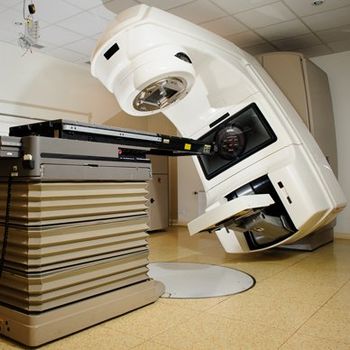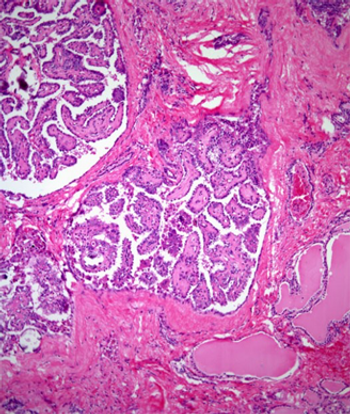
The use of PARP inhibitors in frontline maintenance therapy has greatly reduced the risk of recurrence in patients with ovarian cancer.

Your AI-Trained Oncology Knowledge Connection!


The use of PARP inhibitors in frontline maintenance therapy has greatly reduced the risk of recurrence in patients with ovarian cancer.

CancerNetwork® spoke with Ahmet Murat Aydin, MD, about a study designed to evaluate bipolar radiofrequency ablation.

Establishing a multidisciplinary oral chemotherapy clinic in a community hospital is feasible and could help reduce emergency department visits, recognize adverse events earlier, and improve staff and patient satisfaction.

A study found that several disease- and treatment-specific factors are associated with an increased risk of near misses or safety incidents in patients undergoing radiation therapy.

The use of several simple improvement measures including a “chemotherapy huddle” can result in a marked, sustained reduction in chemotherapy errors in a pediatric oncology setting.

A substantial portion of emergency department visits by patients undergoing cancer treatment may be preventable, and those potentially preventable visits account for a high percentage of the emergency department visit costs.

The use of a customized clinical pathways program that helps manage complexity and guide decisions resulted in a sharp decrease in costs per patient in an analysis of stage IV non–small-cell lung cancer.

Undergoing upfront autologous stem cell transplantation is still the preferred treatment of choice for patients aged 65 or younger with newly diagnosed multiple myeloma, according to interim results of a phase III trial.

Early palliative care in cancer patients led to an improvement in depressive symptoms and quality of life among family caregivers.

The physical location of the primary tumor predicts survival in patients with metastatic colorectal cancer, according to an analysis to be presented at ASCO.

Treatment with the anti–PD-1 antibody pembrolizumab yielded good long-term survival outcomes in a phase Ib trial of patients with advanced melanoma.

A meta-analysis of phase I trials found that using biomarker-guided treatment can yield high response rates even in this early phase of drug development.

Researchers identified a novel gene that may predispose individuals to Cowden syndrome, an inherited condition that carries an especially high risk for various epithelial cancers and especially thyroid cancer.

Pembrolizumab, a PD-1 inhibitor, demonstrated better overall survival and progression-free survival vs docetaxel in non–small-cell lung cancer patients.

The overall risk of developing a second primary thyroid or breast tumor is higher in patients with prior breast or thyroid cancer.

A treatment strategy including dose intensification with interval compression, use of the most active agents available, and the use of irinotecan as a radiation sensitizer led to a promising event-free survival rate in certain patients with metastatic rhabdomyosarcoma.

The FDA announced the approval of trabectedin (Yondelis) for the treatment of liposarcoma and leiomyosarcoma that is either unresectable or has metastasized.

In patients with chronic myeloid leukemia (CML), a prospective, long-term study has found that hematopoietic stem cell transplantation (HSCT) and drug therapy yielded similar 10-year survival outcomes.

The US Food and Drug Administration announced an expanded indication for the Optune device to treat newly diagnosed patients with glioblastoma multiforme.

A new study has found an excess of thyroid cancer cases among children and adolescents who live near the Fukushima Daiichi nuclear power plant.

The US Food and Drug Administration has granted a Priority Review designation to eribulin for the treatment of inoperable soft-tissue sarcoma.

A recent study highlights factors that predict worse prognosis for patients with germ cell tumors whose cancer has spread to the brain, including the presence of liver or bone metastases, multiple brain metastases, and others.

A study looking at trends from 1985 to 2005 found that overall survival has increased in Medicare patients with small-cell lung cancer, and that treatment with chemotherapy is associated with improved survival.

Patients with ALK-rearranged non–small-cell lung cancer and brain metastases survive longer when treated with radiotherapy and tyrosine kinase inhibitors.

Vascular reconstruction increases morbidity in sarcoma patients undergoing resection vs those without vascular procedures, but oncologic outcomes are similar.

The US Food and Drug Administration expanded the approval of the anti-PD-1 immunotherapy agent nivolumab to include advanced non-squamous non-small-cell lung cancer.

A novel program combining radiation oncology with palliative care in patients with painful bone metastases increased the use of proven treatments while maintaining pain management, decreased palliative radiation use, and decreased hospital length of stay.

Papillary thyroid cancer patients at intermediate risk according to guidelines can be reclassified as low risk when postoperative stimulated thyroglobulin is low.

A new risk assessment score more accurately reflects the probability of dying from chronic myeloid leukemia than do existing scoring systems.

Treatment with intermittent imatinib is feasible among elderly CML patients who are stable responders to the drug, according to a new study.